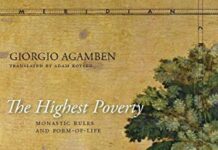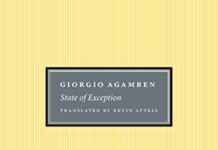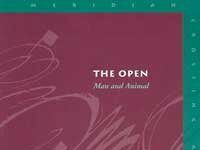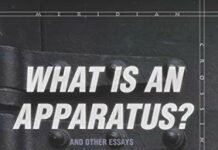
Ebook Info
- Published: 2000
- Number of pages: 328 pages
- Format: PDF
- File Size: 5.44 MB
- Authors: Giorgio Agamben
Description
This book collects fifteen major philosophical essays written over a period of more than twenty years by acclaimed Italian philosopher Giorgio Agamben. The volume opens with an introduction in which the editor situates Agamben’s work with respect to both the history of philosophy and contemporary European thought. The essays that follow articulate a series of theoretical confrontations with privileged figures in the history of philosophy, politics, and criticism, from Plato to Spinoza, Aristotle to Deleuze, Carl Schmitt to Benjamin, Hegel to Aby Warburg, and Heidegger to Derrida. Three fundamental concepts organize the collection as a whole: language, in the sense not of particular statements but rather the very taking place of speech, the pure fact of language’s existence; history, as it appears from a perspective in which tradition, transmission, and memory reach their messianic fulfillment; and potentiality, understood as a fundamental problem of metaphysics, ethics, and the philosophy of language. All these topics converge in the final part of the book, in which Agamben offers an extensive reading of Melville’s short story “Bartleby the Scrivener” as a work that puts potentiality and actuality, possibility and reality, in an altogether new light.
User’s Reviews
Editorial Reviews: Review “Agamben has been attracting attention recently in the English-speaking world, thanks to the increasing availability of his work in translation. This volume is indicative of Agamben’s broad range of interests. . . . Despite this range of interests, however, a sustained commitment to certain theoretical issues―particularly language and history―lends the volume a coherence. . . . Daniel Heller-Roazen’s introduction does a nice job of outlining the philosophical program that motivates these essays, and his translation in general is to be commended for its elegance. Upper-division undergraduates through faculty and researchers.” — Choice From the Inside Flap This volume constitutes the largest collection of writings by the Italian philosopher Giorgio Agamben hitherto published in any language. With one exception, the fifteen essays, which reflect the wide range of the author’s interests, appear in English for the first time.The essays consider figures in the history of philosophy (such as Plato, Plotinus, Spinoza, and Hegel) and twentieth-century thought (most notably Walter Benjamin, but also Heidegger, Derrida, Deleuze, the historian Aby Warburg, and the linguist J.-C. Milner). They also examine several general topics that have always been of central concern to Agamben: the relation of linguistic and metaphysical categories; messianism in Islamic, Jewish, and Christian theology; and the state and future of contemporary politics. Despite the diversity of the texts collected here, they show a consistent concern for a set of overriding philosophical themes concerning language, history, and potentiality.In the first part of the book, Agamben brings philosophical texts of Plato and Benjamin, the literary criticism of Max Kommerell, and the linguistic studies of J.-C. Milner to bear upon a question that exposes each discipline to a limit at which the possibility of language itself is at stake. The essays in the second part concern a body of texts that deal with the structure of history and historical reflection, including the idea of the end of history in Jewish and Christian messianism, as well as in Hegel, Benjamin, and Aby Warburg. In the third part, the issues confronted in the first and second parts are shown to be best grasped as issues of potentiality. Agamben argues that language and history are structures of potentiality and can be most fully understood on the basis of the Aristotelian theory of dynamis and its medieval elaborations. The fourth part is an extensive essay on Herman Melville’s short story “Bartleby, the Scrivener.” From the Back Cover “Agamben has been attracting attention recently in the English-speaking world, thanks to the increasing availability of his work in translation. This volume is indicative of Agamben’s broad range of interests. . . . Despite this range of interests, however, a sustained commitment to certain theoretical issues—particularly language and history—lends the volume a coherence. . . . Daniel Heller-Roazen’s introduction does a nice job of outlining the philosophical program that motivates these essays, and his translation in general is to be commended for its elegance. Upper-division undergraduates through faculty and researchers.”—Choice About the Author Giorgio Agamben, an Italian philosopher and political theorist, teaches at the IUAV University in Venice and holds the Baruch Spinoza Chair at the European Graduate School. His most recent works available in English translation from Stanford University Press include “What is an Apparatus?” and Other Essays (2009), Nudities (2010), The Sacrament of Language(2011), and The Kingdom and the Glory (2011). Read more
Reviews from Amazon users which were colected at the time this book was published on the website:
⭐This is a collection of essays written over a period of twenty years. This book is as stunning in its unexpected insights as it is diffcult to summarize. Agamben’s mastery of classical philosophy and philology gives him the advantage of discussing pressingly modern issues in philosophy, history, politics and criticism as personified in the works of everyone from Aristotle to Heidegger, Benjamin, and Derrida. And that advantage is apparent not only in the ease with which he brings Aristotle’s discussion of dynamis (potentiality) on the issue of redemption and Being, but also in the vividness of ancient philosophy’s immediate relevance to the discussion of the messianic notion of time and history as transmitted to our age through figures such as Kafka, Benjamin and Scholem.This collection of essays is divided into three parts: Language, History, Potentiality. Each section has under it a number of essays loosely pertaining to that category. Under the section on Histroy, for example, we have essays on Aby Warburg and the man’s legacy in the refiguration of the study of art history; on Tradition; on Hegel’s Absolute and Heiddeger’s Ereignis; on Walter Benjamin’s Angel of History; and on Benjamin’s rumination on the Messiah in realtion to the Sovereign.Heiddeger looms, as always, over much of Agamben’s writing, but here so does that which has no name except as a tradition that partakes of the kabbalistic power of deep vision. The content of the book is offered here like so many spores of light, shedding light on so much of what constitutes the abyss/ground of modernity, but resisting capture in the stiff net of unimaginative academic argumentativeness. The prose is as dense as usual, reflecting the very density of the topics the author is trying to analyse. A most head-on collision of a reading.
⭐This is one of the most significant collections of Agamben’s writings on philosophy. Covering a wide ranging topics from the almost phenomenological opening “The Thing Itself” to Benjamin, Warburg, Hegel and Heidegger, the essays outline in different ways a fundamental and decisive break between metaphysical and post-metaphysical thinking.The chapter on Deleuze “Absolute Immanence” is especially profound as it sets out to explain Deleuze’s idea of “life” in the context of other thinkers such as Kant, Spinoza, Husserl and Heidegger. This short chapter merits a detailed study and interpretation as it represents one of the most succinct and penetrating thought into the heart of Deleuze’s philosophy of life.There are potentialities, not just one potential for each being (Aristotle).
⭐Potentialities, or more precisely, potentia passiva. Reception and capability go together: the hand is the gift that gives itself (handshake) and receives: catch! The chapter on Heidegger and Stimmung is for me the most interesting. The word “facticity” is confusing because it implies making (factum est verum), but is the very opposite of any making (ie, thrownness). Agamben traces in the word the common root of both fetish and faktish, and finds in the notion of Stimmung a weise, a face, or guise. There too is a passivity, and the passivity of “affect” as both reception and potential (the ability to receive: endexetai). Heidegger would perhaps find there xeir-, or hand: VorHANDenheit and ZuHANDenheit). Aisthesis as both an activity (-is) and a passivity (think of all the plays on the word horen in S&Z). The introduction by the translator is curious. As for the distinction of intentio prima and intentio secunda, it is the very basis of modern science and Descartes’ geometry: not this conic section (intentio prima) but every conic section (intentio secunda taken as intentio prima). That is the origin of Husserl’s “sedimentation,” and hence the return to the “things themselves.” In sum, much can be learned from this book.
⭐The best place to start with this formidable thinker. What a beautiful writer.
⭐Difficult in the best sense but full of new thinking and boundary breaking insights. Worth a slow read for sure
⭐
Keywords
Free Download Potentialities: Collected Essays in Philosophy 1st Edition in PDF format
Potentialities: Collected Essays in Philosophy 1st Edition PDF Free Download
Download Potentialities: Collected Essays in Philosophy 1st Edition 2000 PDF Free
Potentialities: Collected Essays in Philosophy 1st Edition 2000 PDF Free Download
Download Potentialities: Collected Essays in Philosophy 1st Edition PDF
Free Download Ebook Potentialities: Collected Essays in Philosophy 1st Edition




